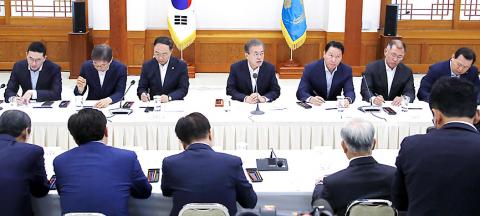South Korean President Moon Jae-in yesterday said Japan’s export curbs on key materials used by South Korean technology firms could be prolonged and his government would sharply boost spending to help reduce their reliance on Japanese suppliers.
Japan last week said it would tighten restrictions on exports of three materials used in smartphone displays and chips, citing a dispute with Seoul over South Koreans forced to work for Japanese firms during World War II.
The growing row threatens to disrupt supplies of chips and displays by South Korea’s tech giants Samsung Electronics Co and SK Hynix Inc, which count Apple Inc and other smartphone makers as customers and account for almost two-thirds of global chip production.

Photo: AP
“We can’t rule out the possibility that the situation would be prolonged, despite our diplomatic efforts to resolve the issue,” Moon said at a meeting with executives from South Korea’s top 30 conglomerates, including Samsung, Hyundai Motor Co and Lotte Group.
“It is a very regrettable situation, but we have no choice but to prepare for all possibilities,” Moon said, adding that the government would sharply increase spending to help firms source parts, materials and equipment domestically.
A “joint government-private sector response system is required as we are in an unprecedented emergency,” he said.
He also dismissed reported remarks by a politician in Japan that South Korea illegally shipped hydrogen fluoride imported from Japan to North Korea in contravention of international sanctions, calling them “groundless.”
Hydrogen fluoride, a chemical covered by the Japanese export curbs, can be used in chemical weapons.
“It is not desirable at all ... that Japan takes measures that deal a blow to our economy because of political purpose and makes remarks that link the measures to sanctions on North Korea,” Moon said.
South Korea’s bread-and-butter chip industry accounts for 20 percent of its exports.
“We will seek international cooperation as the measures will naturally have an adverse impact on the global economy,” Moon said.
Additional reporting by AFP

Sweeping policy changes under US Secretary of Health and Human Services Robert F. Kennedy Jr are having a chilling effect on vaccine makers as anti-vaccine rhetoric has turned into concrete changes in inoculation schedules and recommendations, investors and executives said. The administration of US President Donald Trump has in the past year upended vaccine recommendations, with the country last month ending its longstanding guidance that all children receive inoculations against flu, hepatitis A and other diseases. The unprecedented changes have led to diminished vaccine usage, hurt the investment case for some biotechs, and created a drag that would likely dent revenues and

Global semiconductor stocks advanced yesterday, as comments by Nvidia Corp chief executive officer Jensen Huang (黃仁勳) at Davos, Switzerland, helped reinforce investor enthusiasm for artificial intelligence (AI). Samsung Electronics Co gained as much as 5 percent to an all-time high, helping drive South Korea’s benchmark KOSPI above 5,000 for the first time. That came after the Philadelphia Semiconductor Index rose more than 3 percent to a fresh record on Wednesday, with a boost from Nvidia. The gains came amid broad risk-on trade after US President Donald Trump withdrew his threat of tariffs on some European nations over backing for Greenland. Huang further

CULPRITS: Factors that affected the slip included falling global crude oil prices, wait-and-see consumer attitudes due to US tariffs and a different Lunar New Year holiday schedule Taiwan’s retail sales ended a nine-year growth streak last year, slipping 0.2 percent from a year earlier as uncertainty over US tariff policies affected demand for durable goods, data released on Friday by the Ministry of Economic Affairs showed. Last year’s retail sales totaled NT$4.84 trillion (US$153.27 billion), down about NT$9.5 billion, or 0.2 percent, from 2024. Despite the decline, the figure was still the second-highest annual sales total on record. Ministry statistics department deputy head Chen Yu-fang (陳玉芳) said sales of cars, motorcycles and related products, which accounted for 17.4 percent of total retail rales last year, fell NT$68.1 billion, or

Macronix International Co (旺宏), the world’s biggest NOR flash memory supplier, yesterday said it would spend NT$22 billion (US$699.1 million) on capacity expansion this year to increase its production of mid-to-low-density memory chips as the world’s major memorychip suppliers are phasing out the market. The company said its planned capital expenditures are about 11 times higher than the NT$1.8 billion it spent on new facilities and equipment last year. A majority of this year’s outlay would be allocated to step up capacity of multi-level cell (MLC) NAND flash memory chips, which are used in embedded multimedia cards (eMMC), a managed